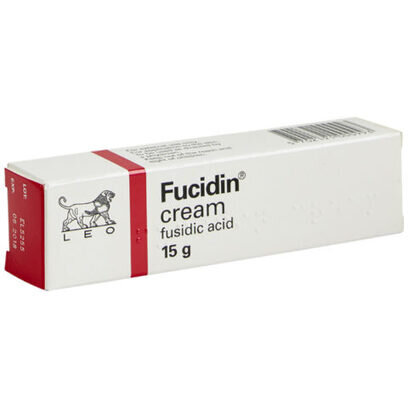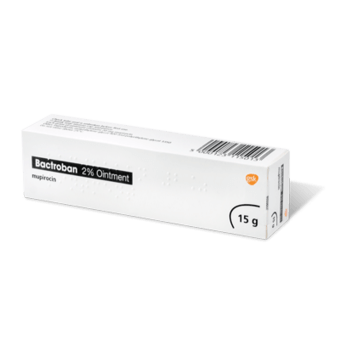Before we can issue a treatment, you’ll need to answer a short assessment. This assessment will help us recommend the right treatment for you.

Fucidin Cream
From £8.99
Bactroban Cream & Ointment
From £13.99
Our site uses cookies. By continuing to use our site you agree to our cookie policy.
Free delivery on orders over £50
Before we can issue a treatment, you’ll need to answer a short assessment. This assessment will help us recommend the right treatment for you.
Skin is the largest body organ that protects your body from infections. The infections may be a result of germs, bacteria, fungi, or parasites. Skin infections are treatable when the right diagnosis test is done. If you have a skin infection, Ashcroft Pharmacy, a UK-licensed pharmacy, offers a variety of skin infection treatments, including antibiotics creams, ointments and more.


Skin infection is an infection caused by an organism that grows in or on your skin.
Below are the 4 types of skin infections:
Parasitic infections: Lice, scabies, and bed bugs cause parasitic skin infections. The parasites burrow into your skin to live there or to lay eggs. Once they bite, they cause symptoms such as fever, skin rashes, and itching.
Fungal infections(Mycosis): Fungal infections are caused by yeast or mold. Fungal infections are present on the nails, skin, hair, or mucous membranes. Fungal infections make your nails look thick, discolored, and cracked while your skin becomes red and swollen.
Bacterial infections: Bacterial skin infection results from bacteria getting into your skin through the hair follicles or skin opening. Skin opening can be a result of scrapes, injury, insect bites, or recurring skin conditions. Examples of bacterial skin infections include boils, impetigo, cellulitis, and leprosy.
Viral skin infection
A virus causes viral skin infections. Viral skin infections are contagious and can cause symptoms such as chicken pox, measles, wart, foot hand, and mouth disease, and shingles.
How is a skin infection diagnosed?
The doctor can diagnose skin infection by performing a visual examination of your skin or by checking the locality of the infection.
You can prevent skin infections by avoiding skin infection triggers and practicing healthy lifestyle habits. Below are some of the prevention measures you can adopt.
✅ Cleanliness
Taking a warm birth at least 2 times a day will protect your skin from infections. Also regularly cleaning any material that gets into contact with your skin will keep skin infections at bay. These materials include bedding, clothes, and cushion cases.
✅ Use protective barriers when using public facilities
Gym and communal bathrooms expose you to the dangers of skin infections. Use your clean towels when wiping out sweat as well as gloves to clean public facilities.
✅ Moisturize your skin appropriately
Dry skin may crack leading to entry of bacteria through your skin. Moisturizing your skin keeps it smooth and well hydrated preventing cracks and flakes.
✅ Protect your skin from cuts
Always put on protective gloves when handling sharp edges.
✅ Avoid sharing personal items
Sharing personal items such as towels and makeup kits can spread skin infections.
✅ Check up your skin regularly with a dermatologist
If you have a history of recurring skin infections, you must go for skin checkups and seek medical advice.
✅ Taking vaccinations
Vaccinations such as chicken pox help prevent skin infections by strengthening your immune system.
✅ Drinking enough water
Water helps by keeping your skin hydrated. If you are not fond of plain water you can add more fruits and vegetables to your diet. Another strategy is the use of measuring water bottles to keep track of the amount of water you take per day.
Skin infection treatments are given according to the severity of the symptoms and the cause of the infection. Diagnosis helps the doctor identify the specific type of infection you are suffering from and the best type of treatment.
Viral infections cannot be treated with antibiotics some of the symptoms go away on their own needing no medication.
The most common skin infection treatments are antifungals, antibiotics, antivirals, and antiparasitics. Below are the recommended treatments for various types of skin infections.
Bacterial skin infection:
Bacterial skin infections can be treated with antibiotics such as fucibet cream
Treatment for parasitic skin infection
The doctor may recommend oral parasitic medications. Parasitic skin infections are also treatable with a change of lifestyle techniques such as maintaining a healthy skincare routine and cleanliness.
Medication for Viral skin infection
Viral skin infection is treatable with oral medication, topical treatments, or antiviral treatment.
Treatments for Fungal skin infection
Canesten cream is highly recommended for treating fungal skin infections. It works quickly and is reliable.
Skin infection symptoms vary, they can be attributed to factors such as the immune system(weak), the cause of an infection, and the type of infection.
Common symptoms of skin infection include:
Rare symptoms of skin infection include:
There are 4 major causes of skin infections: Bacteria, fungi, parasites and viruses
There are skin infections that can disappear on their own, however, skin infection symptoms can take between 3 to 2 weeks to disappear. If your current treatments don't work visit your pharmacist for further advice.
The best way to know the type of skin infection affecting you is to get diagnosed by a dermatologist.
Examples of natural antibiotics to treat skin infections include garlic, cloves, honey, and ginger.
The most common and highly contagious skin infection is known as impetigo.
Most skin infections show symptoms such as rashes, irritation, itching, and small growth.
Skin infections start when bacteria enter the skin or you get a skin bite.
Follow your doctors' instructions by taking the right dosage, and avoid sharing antibiotics with family or friends.
Order Monday to Friday before 14:00pm to guarantee next day delivery